Looking back on 275 years of Jacobite historiography since the end of the Forty-five alone, those of us who are interested in the subject truly are faced with an embarrassment of riches. Despite the dissonant, alternating cycles of Whiggish and sympathetic interpretation and the repeated calls for scholars to stop writing about Jacobites already(!), the broad narratives and fine details of this intricate and mythologized era continue to inspire, challenge, and entice both specialists and the wider public.1 For those who have recently found themselves drawn into the history of the Jacobite century (1688-1788), knowing just where to start can be overwhelming. Even experienced readers and researchers who are already familiar with the subject’s historiography might have missed some excellent titles due to restrictions on access, lack of availability, or simply not knowing that they are out there.
With this in mind, we present a series of short articles to help acquaint folks with finding sources that advance the discipline through rigorous, professional scholarship. This series of posts will cover a number of disparate categories of historiography, starting with academic monographs intended for readers who seek more ‘formal’ material concerning Jacobite studies. Other categories will include, for example, edited anthologies, popular history, antiquarian sources, journal articles, archival collections, and scholar spotlights.
What follows is one passionate historian’s list of ten scholarly works of Jacobite history – or, more accurately, works about historical Jacobitism – that are worth considering as ‘essential’ secondary-source references.2 A few notes about the formation of this list:
• The sources herein are presented in no particular order of value or importance.
• Most, but not all, of the following sources are monographs that focus on broad aspects of the Jacobite century.
• Representing a relatively modern phase of scholarship, books included here were published between 1971 and 2019.
• If a source has not been included in this list, this does not mean it is neither excellent nor worth your time.
• Readers are welcome to chime in with other choices in the comments as long as they are respectful and constructive.
• Keep in mind that this is only the first of a series of ‘essentials’ relating to Jacobite studies!
• A comprehensive (and growing) bibliography of historical Jacobite sources can be found in the JDB1745 Zotero Library.
Essential Academic Jacobite Sources
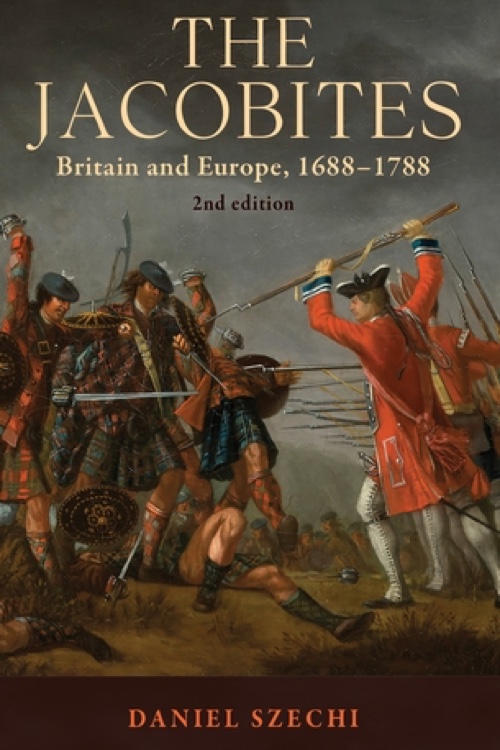 The Jacobites: Britain & Europe, 1688-1788 (2nd Edition)
The Jacobites: Britain & Europe, 1688-1788 (2nd Edition)
Daniel Szechi | Manchester University Press, 2019
The brand new edition of the go-to survey of Jacobitism and its background, including its century-long, international context, by one of the sharpest living scholars of eighteenth-century history. Szechi writes magnificent prose that is both lively and pragmatic, giving equal respect to venerable scholars in the field and the younger ones who are taking it in new directions. The updated edition features uncomplicated explorations of Jacobite ideology, how the movement developed during and between the risings, and, most vitally, the impact it had on the British state and beyond from the Revolution to the death of Charles Edward Stuart. It is no wonder that this title has been on numerous university reading lists as a concise introduction to the subject, and long there it shall remain.
 The Myth of the Jacobite Clans: The Jacobite Army in 1745 (2nd Edition)
The Myth of the Jacobite Clans: The Jacobite Army in 1745 (2nd Edition)
Murray Pittock | Edinburgh University Press, 2009
Pittock is an impressively productive, creative scholar with a wide range of interests and, therefore, an industrious output. Jacobite studies is but one area of his broad expertise, but it is a fundamental one and has been so throughout his celebrated career. The second edition of The Myth of the Jacobite Clans tackles the motivations and composition of the last and most successful Jacobite army, but it is not a military history in the traditional sense. Rather, this compact and accessible primer provocatively confronts popular beliefs about Scottish Jacobitism presented in Pittock’s inimitable, mythbusting style. Though at times this naturally generates further mythology, especially around the patriotic component of plebeian Jacobitism, his archive-heavy references challenge readers to follow up on the primary sources to broaden their bases of knowledge.
 The Jacobite Risings in Britain 1689-1746
The Jacobite Risings in Britain 1689-1746
Bruce Lenman | Methuen, 1980
Before the first edition of Szechi’s complete survey was released in 1994, Bruce Lenman’s The Jacobite Risings in Britain was really the first of its kind to successfully address the entire Jacobite century in one go. Written in a no-nonsense manner that at times can border on cantankerous, Lenman excels at fitting large concepts into small parcels for easy comprehension, and chuckles from his distinctly irreverent turns of phrase come fast and often. Lenman serves from an enormous well of knowledge about British and Scottish social and economic history, and this is plain to see both in the content and construction of his publications. He is the anti-romanticist, and his is therefore a valuable perspective to apply to this oft-fabled subject matter.
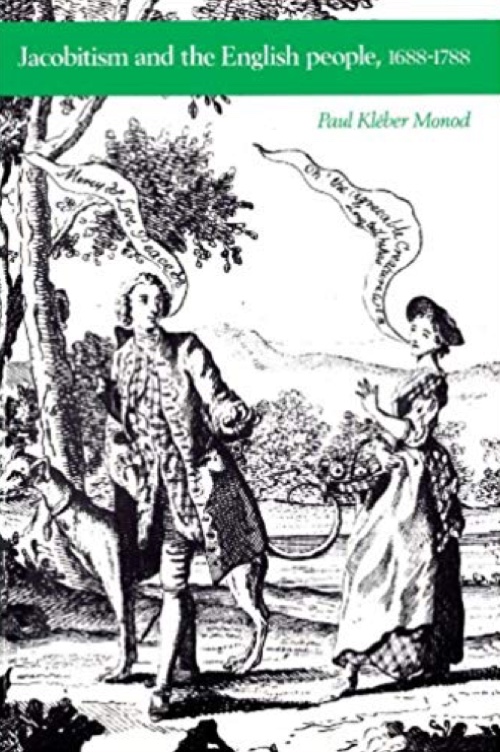 Jacobitism and the English People, 1688-1788
Jacobitism and the English People, 1688-1788
Paul Kleber Monod | Cambridge University Press, 1989
Diligently representing the American cohort of prolific social and intellectual scholars of the eighteenth century, Paul Monod’s magnum opus is an impressively mature and detailed study of how Jacobite sentiment infiltrated and influenced English society through the full hundred years of its relevance. The book’s thoughtful introduction is dedicated to defining Jacobitism’s many strains and guises, and Monod correctly stresses its amorphous character within both elite and popular culture, which he wonderfully likens to ‘fog around a lamp-post’. With this so framed, the book then efficiently dives into the broad scope of Jacobite rhetoric, material culture, and strategies of protest for the disaffected both in English cities and in the rural localities – all of it written lucidly and with convincing analytical rigor.
Ireland and the Jacobite Cause, 1685-1766: A Fatal Attachment
Éamonn Ó Ciardha | Four Courts Press, 2002
While later-era Jacobitism commenced and concluded in Scotland and was driven by a non-juring Episcopalian majority, Irish Catholic cultural and political ideologies energetically generated Jacobite resistance to the Protestant succession resulting from the Glorious Revolution, and defended it in blood through the Williamite War in Ireland. Ó Ciardha’s treatise is the definitive account of the depth of Hibernian Jacobite opposition from the accession of James II to the death of his son, ‘the Old Pretender’. Identifying discrete phases of Jacobite activity through the century, Ó Ciardha wraps tenacious Irish commitment to the cause within the fold of European politics and, through meticulous research and abundant examples of Gaelic poetry, describes its eventual metamorphosis into republicanism.
Clanship, Commerce and the House of Stuart, 1603-1788
Allan I. Macinnes | Tuckwell Press, 1996
A most indomitable expert of early-modern Scotland, Macinnes has written the pioneering appraisal of Highland clanship, and one that is crucial for understanding the Gàidhealtachd as a distinct ‘geographic and cultural entity’ outwith the application of pop-culture romanticism. Targeting a far greater sphere than Jacobitism alone, Clanship, Commerce and the House of Stuart is an incisive social ethnography of Gaeldom and its involvement within and against the British state over two centuries of perpetual change. Through a potent blend of archival sources and assertive prose, Macinnes provides a thorough look into the structure and oral tradition of Highland culture and its fluctuating connection with both the Covenanting and Jacobite movements – and its impact beyond the influences of both.
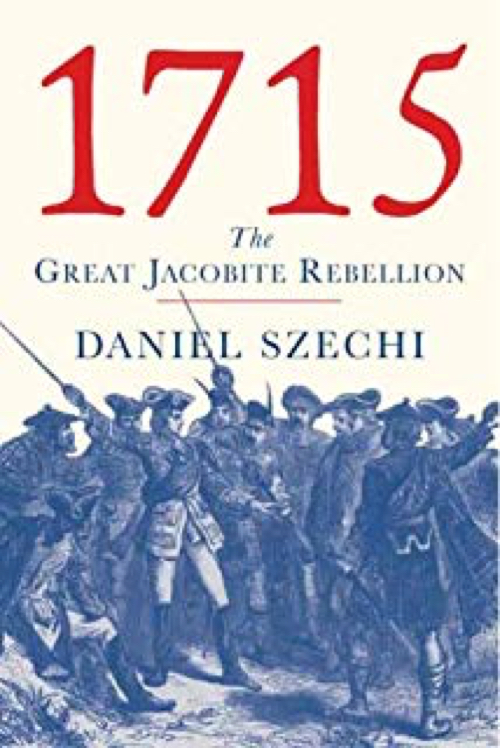 1715: The Great Jacobite Rebellion
1715: The Great Jacobite Rebellion
Daniel Szechi | Yale University Press, 2006
Though limited in scope to the Fifteen alone, Szechi’s account of the largest – and arguably the most significant – of the Jacobite risings is seminal enough to justify its place on this list. It is an exhaustively researched, well-written modern text on the ‘Great Rebellion’ that is presented with neutrality and balanced judgement. Naturally emphasizing the stronger Jacobite connection with anti-Union rhetoric just eight years after its establishment, Szechi gives equal time to the concerns of both elites and plebeians, the latter of which are often relegated to thoughtless automatons within studies of Jacobite motivation. Acknowledging that the affair was not as romantic, as memorialized, or even as interesting as the effort led by Bonnie Prince Charlie thirty years later, Szechi’s entertaining treatment of culture and consequences describes the acme of Jacobitism in a manner that directly explains how it endured.
Jacobite Prisoners of the 1715 Rebllion:
Preventing & Punishing Insurrection in Early Hanoverian Britain
Margaret Sankey | Ashgate, 2005
The second book on this list that deals exclusively with the rising in 1715, Margaret Sankey’s thesis and methodology are the foundational elements that render it indispensable and applicable to the greater Jacobite era. Following her analysis of the institutional process and treatment of the 1300 Jacobite prisoners taken during the episode comes a compelling assessment of what it all meant to and for the Hanoverian government under George I. Arguing that public reception of the then-fledgling polity weighed heavily upon the king’s directives for punishing treasonous activities, Sankey demonstrates that navigating the balance between justice and mercy was at the very core of British government policy as a ‘true test’ of the administration’s effectiveness and stability. The fact that this stands in such stark contrast to the government’s reaction after the Forty-five makes this approach all the more valuable.
 The Jacobite Threat – Rebellion & Conspiracy 1688-1759: England, Ireland, Scotland & France
The Jacobite Threat – Rebellion & Conspiracy 1688-1759: England, Ireland, Scotland & France
Bruce Lenman & John Gibson | Edinburgh Scottish Academic Press, 1990
Not a monograph but an anthology of primary-source material that illustrates the role of Jacobitism in international politics, this collection is an invaluable introduction to the subject directly from the pens of the elites who organized and opposed it. Punchy, accessible commentary by Lenman and Gibson introduces the documentary transcriptions, which are arranged historically by both theme and crisis, and the selections widely represent the international context of Jacobitism from perspectives of cause, intrigue, and resistance. In short, there is no better all-in-one volume of archival material that offers a more comprehensive look both at the reach and at the scope of the Jacobite phenomenon. Lenman’s exemplary introduction alone should be required reading for all students of the period.
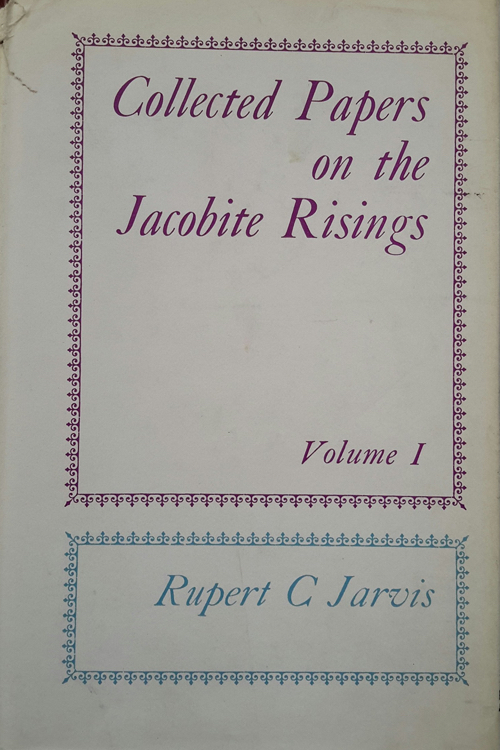 Collected Papers on the Jacobite Risings (2 vols.)
Collected Papers on the Jacobite Risings (2 vols.)
Rupert C. Jarvis | Manchester University Press, 1971-1972
Despite being published nearly fifty years ago, Jarvis’ two-volume set of Collected Papers on the Jacobite Risings is still relevant and indispensable. The titular ‘papers’ are a selection of Jarvis’ essays on Jacobitism and anti-Jacobitism rather than simply transcriptions of archival documents, and they represent the work of a rigorous scholar who was active before the more recent cultural and emotional revival of interest in the subject. In this sense, Jarvis is unaffected by external factionalism and presents a notably clearheaded account of numerous Jacobite-related themes, including military affairs, judicial processes, and events pertaining to the localities. Frustratingly, the localities on which he focuses are almost all in England during the Forty-five alone, as are most of the sources he uses as reference. Nonetheless, Jarvis’ work still stands today as the preeminent English voice on the archival minutia of the the final Jacobite rising.
Notable alternates:
• The Jacobite Movement in Scotland & Exile, 1746-1759, Doron Zimmermann (Palgrave Macmillan, 2003)
Though practical Jacobitism died at Culloden, the ideologies of the movement and the incessant plotting between Charles Edward and the bulk of his remaining support in the Scottish Highlands continued on both overtly and clandestinely until the Battle of Quiberon Bay.
• The Jacobites and Russia 1715-1750, Rebecca Wills (Tuckwell Press, 2002)
Wills examines the lives of Scottish soldiers who served the Russian tsars between the two largest risings while surveying the tenacity (and lack thereof) of their Jacobite ideologies as their focus shifted to full-time military concerns and gainful employment.
• Jacobite Estates of the ’45, Annette M. Smith (John Donald, 1982)
A thorough study on the forfeiture process and the government’s annexation policies implemented upon notable Jacobite estates after Culloden. Working directly with the Forfeited Estates Papers, Smith effectually charts the fortunes of attainted Jacobite elites through the timeline of the rising.
• Scottish Society 1707-1830: Beyond Jacobitism, Towards Industrialisation, Christopher A. Whatley (Manchester University Press, 2000)
As stated in the subtitle, this book is decidedly not about Jacobitism – and that is precisely why it is so valuable. Whatley firmly places the movement in the context of a rapidly modernizing century and chooses to focus on how Scottish society developed and endured during an age of revolution and extreme social conflict. In doing so, he describes the imposition of order – and the struggle against it – on all levels of the Scottish experience, identifying Jacobitism as but one of many destabilizing factors of the period.
Darren S. Layne received his PhD from the University of St Andrews and is creator and curator of the Jacobite Database of 1745, a wide-ranging prosopographical study of people concerned in the last rising. His historical interests are focused on the mutable nature of popular Jacobitism and how the movement was expressed through its plebeian adherents. He is a passionate advocate of the digital humanities, data and metadata cogency, and Open Access.

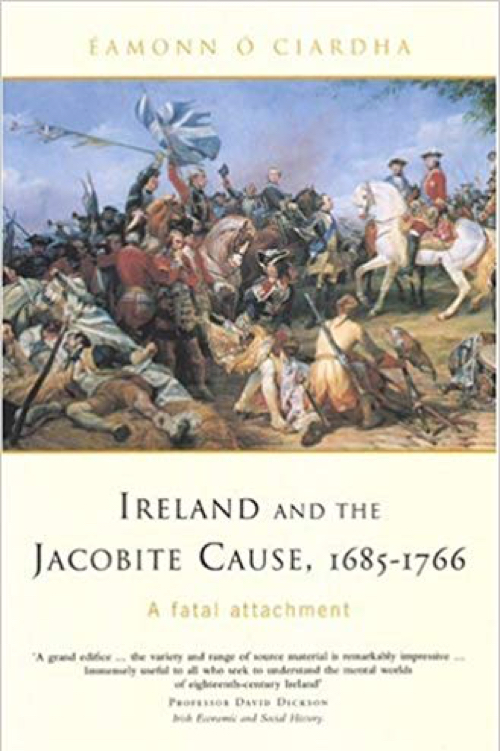
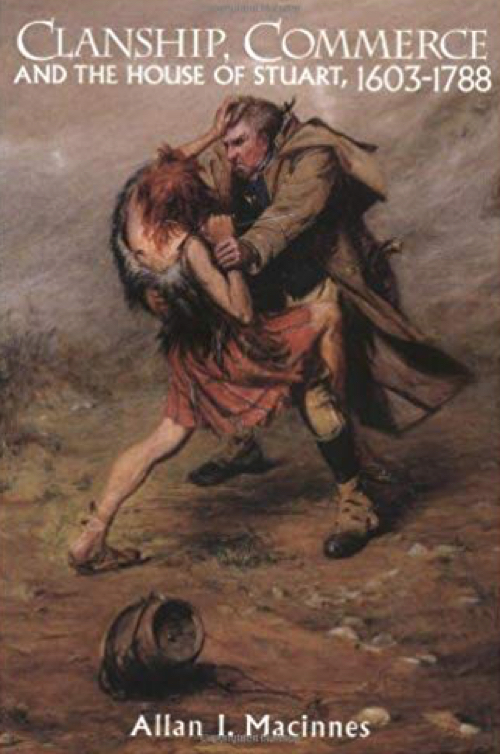




An interesting list and I would have thought fairly non-controversial. Except of course for the absence of Chris Duffy’s Fight for a Throne which despite its scrambled footnotes is, in my opinion, the pre-eminent account of the ’45 – and likely to remain so for many years. It would be in my ‘top three’ along with Szechi’s 1715 and Lenman’s Jacobite Risings, which, taken together, give a great introduction to the subject.
Duffy’s book will be appearing on two other lists planned for this series. While a fantastic read, it is simply too slanted toward military history to have made this one.
Fair point – look forward to the future lists
I’m actually looking for a treatment of the military dimension and considering either “Fight for a Throne” or Duffy’s earlier “The ’45”. I’m not clear from the online reviews if the former is a revision of the earlier book or if they’re two separate treatments. Thoughts from anyone who’s read them would be appreciated.
Hi John, Fight for a Throne is a revision of Duffy’s earlier book and effectively replaces and supplements the information in The ’45. I consider it to be the best military survey of the campaign currently available.
Thanks very much.
This is a good list with one glaring exception, haha! Have you seen Pittock’s list on fivebooks?https://fivebooks.com/best-books/murray-pittock-jacobitism/
I have indeed, David, and have promoted it in the past. Perhaps your recent offering might find its way on to one of these lists!